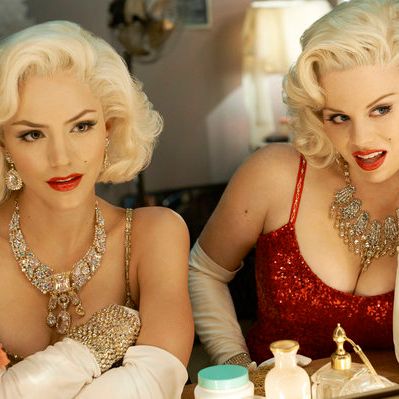
The new NBC drama Smash has a bravura opening: aspiring Broadway star Karen Cartwright (American Idol runner-up Katharine McPhee) belting ÔÇ£Somewhere Over the RainbowÔÇØ on a deep blue stage with a backdrop of stars. KarenÔÇÖs voice sounds recognizably human rather than Auto-Tuned into robotic glop, and instead of cutting to a new angle every three seconds, the camera picks one and stays with it. Then we hear a ringing phone; the orchestra cuts off, and weÔÇÖre in an audition room, where a casting agent has decided to take a call in the middle of KarenÔÇÖs tryout. ItÔÇÖs a gag that anyone whoÔÇÖs auditioned will appreciate. Unfortunately, itÔÇÖs also a metaphor for SmashÔÇÖs problems. This series from Pulitzer-nominated playwright Theresa Rebeck (Omnium Gatherum) about the making of a new Marilyn Monroe musical keeps creating spellbinding musical moments, then yanking us out of them.
Executive produced by Steven Spielberg, Smash embellishes backstage archetypes with believable details. The core cast includes seasoned creative team Julia Houston and Tom Levitt (Debra Messing and Christian Borle); producer Eileen Rand (Anjelica Huston), whoÔÇÖs trying to finance the Marilyn project with money thatÔÇÖs tied up by her divorce; a womanizing Brit director, Derek Wills (Jack Davenport), whoÔÇÖs as rude as he is brilliant; and two strong contenders for the lead role (McPhee and New York stage vet Megan Hilty), who represent innocence and experience respectively. And the ┬¡music ÔÇö a mix of pop and Broadway ┬¡standards, and originals by Marc Shaiman and Scott Wittman (Hairspray) ÔÇö is sure to do brisk business on iTunes. As somebody who needs to hear a certain number of show tunes each day to be happy, IÔÇÖm grateful that Smash even exists.
Why, then, does this series feel sanded down and softened? Maybe itÔÇÖs because Smash is an expensive show and the centerpiece of NBCÔÇÖs midseason schedule; thereÔÇÖs too much at stake to indulge the anything-goes spirit that makes Glee so uneven (and sometimes brilliant). In any event, I miss the sting that All About Eve and All That Jazz brought to similar material. The characters are smartly written and acted but too network-TV-likable ÔÇö even Derek, whose icy charisma and withering stare are undercut by revelations that he, too, has a heart. (Glee did the same thing with its meanest and most vivid character, Sue Sylvester.)
For all its exuberance, Smash seems wary of taking too many creative risks out of the gate, or even surrendering to the euphoria of song and dance for more than a couple of minutes at a time, perhaps for fear of driving away non-Tony-handicapping viewers. And itÔÇÖs reluctant to engage with the most potentially revelatory aspect of its milieu, the sight of creative people shaping notions into numbers and pitches into books; considering the plethora of hit unscripted-┬¡musical-competition programs, including SmashÔÇÖs lead-in, The Voice, its skittishness on this point is bizarre. The series keeps short-circuiting potentially electrifying rehearsals and performances to take care of dramatic housekeeping: Will Derek manage to bed Karen or her rival, Ivy Lynn, and if so, will that determine who plays Marilyn? Will Julia and her husband, Frank (Broadway star Brian dÔÇÖArcy James, who for some reason is cast in a non-singing role), succeed in adopting a Chinese baby? Will Eileen have to sell her beloved Degas sketch to help finance the workshops? Will KarenÔÇÖs dad (Dylan Baker) and her boyfriend Dev (Raza Jaffrey) get tired of subsidizing her dreams?
These subplots arenÔÇÖt inherently dull, but theyÔÇÖre not as compelling as the sight of a singer belting a new ballad while its authors and their patrons look on, anxiously trying to gauge whether itÔÇÖs the lyrics, the score, or the performance thatÔÇÖs keeping their multi-million-dollar dream from jelling. The likes of American Idol have primed mainstream audiences for a theatrical show about the minutiae of the artistic process; this engaging series has the means and the mandate to dramatize it, and if it gets renewed, maybe it will. Break a leg, Smash; IÔÇÖm rooting for you.


